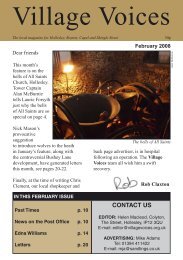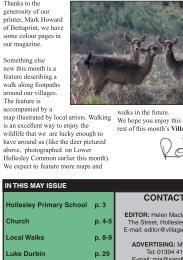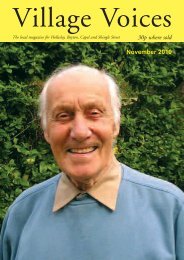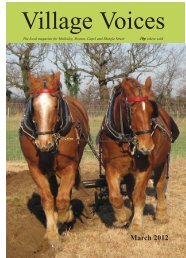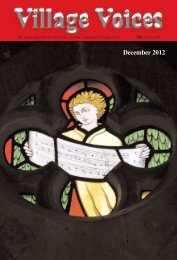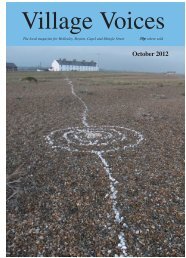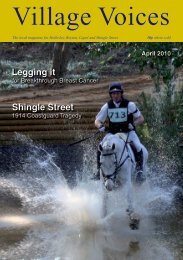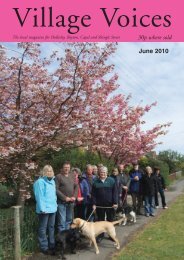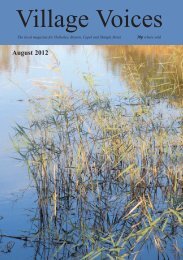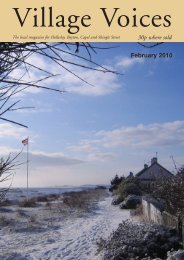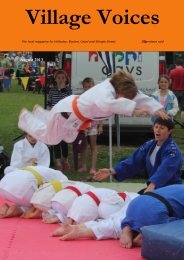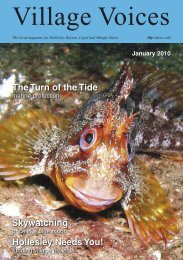April 2008 - Village Voices
April 2008 - Village Voices
April 2008 - Village Voices
Create successful ePaper yourself
Turn your PDF publications into a flip-book with our unique Google optimized e-Paper software.
The Recycling Experience<br />
Ten of us from Hollesley WI visited<br />
Viridor Waste Management at Great<br />
Blakenham to see what happens to the<br />
contents of our blue-topped waste bins. It<br />
truly was an amazing experience. We were<br />
welcomed by Gaye Glading, the Education<br />
Officer, who regularly takes adult groups<br />
round the plant. We donned our hard hats<br />
and high visibility waistcoats and were<br />
connected by radio so that we could hear<br />
Gaye as she explained each step of the<br />
recycling process as we followed her<br />
round.<br />
We watched as lorries brought in the<br />
contents from customers’ blue-topped bins<br />
and tipped them out in a great mountain.<br />
The recyclate was carried up ramps and<br />
around the enormous space and through<br />
channels which begin the process of<br />
separation. Paper is spun in large drums,<br />
magnets extract metal cans and a different<br />
machine removes aluminium cans.<br />
Teams of Lithuanian workers work<br />
very hard and fast at different moving<br />
belts taking out anything which is not in<br />
the category they are dealing with. They<br />
come to work here on a short contract,<br />
living in local rented accommodation.<br />
They earn enough to buy a car and to send<br />
money home for their families, or perhaps<br />
to pay for a child to go to university.<br />
The last process is to bale up the sorted<br />
recyclate which is taken by container to<br />
Felixstowe and shipped to China and other<br />
countries where goods are made from the<br />
recycled materials such as plastic<br />
containers, linings for anoraks, sleeping<br />
bags and even clothing. We were<br />
impressed with the cleanliness of the plant<br />
and the efficient way extractors kept dust<br />
and dirt to a minimum. We spent some<br />
time asking questions over a welcome<br />
mug of coffee. We all have a list at home<br />
of what we should or should not put in our<br />
bins.<br />
What else should we NOT put in our<br />
bins?<br />
1. Plastic carrier bags are a big<br />
problem. They cannot be recycled<br />
and take 500 years to degrade.<br />
We must say NO to them and<br />
find alternatives.<br />
2. Any film or soft plastic that can<br />
be scrunched up by hand cannot<br />
be recycled at the plant.<br />
3. Flower pots, however clean<br />
should not be put in bins.<br />
4. Tetrapaks, packaging from tablets<br />
and other bonded materials<br />
cannot be separated at the plant.<br />
5. Shredded paper clogs up the<br />
machines. Put it in with the<br />
compost.<br />
6. Any long items, especially tapes<br />
which may get wound up in the<br />
mechanism.<br />
7. Aerosols can explode.<br />
8. Polystyrene, pots and pans,<br />
string.<br />
Landfill sites are filling up fast<br />
everywhere and all of us must do our bit<br />
to recycle what we can. At Great<br />
Blakenham the plant serves most of<br />
Suffolk except the far north of the region.<br />
It is one of the most efficient recycling<br />
plants in the country and can recycle up to<br />
97% of what comes in. It is up to each one<br />
of us to do our bit and make that figure<br />
rise even higher, (see colour photo<br />
page 4).<br />
Helen Macleod<br />
<strong>April</strong> <strong>2008</strong> page 34 www.villagevoices.org.uk



